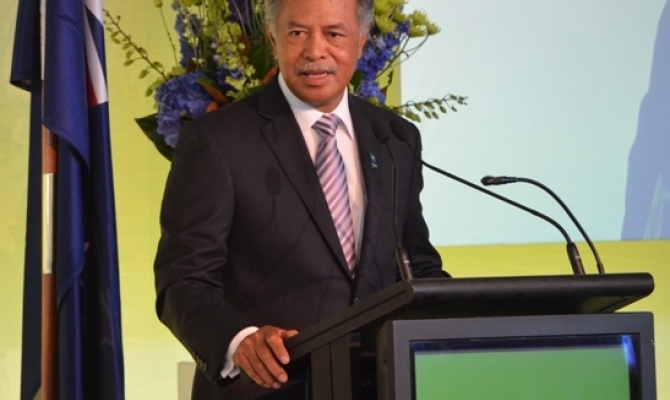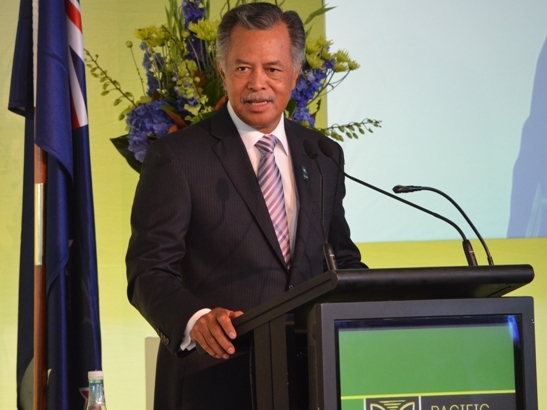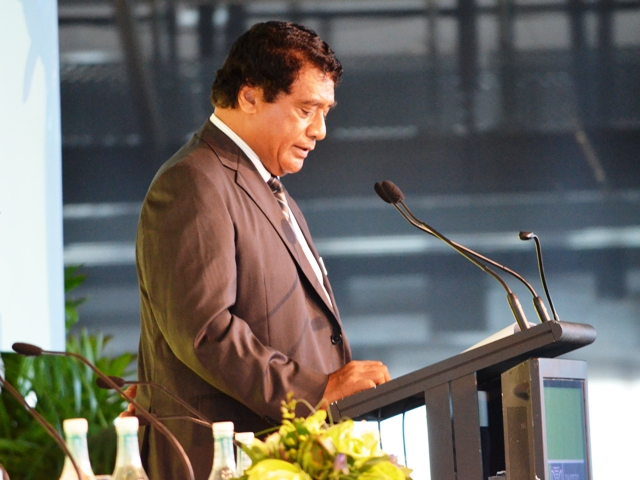
24 March 2013, Auckland, New Zealand -The Cook Islands Prime Minister Hon. Henry Puna has called for a stronger, unified effort by the Pacific to break its dependency on fossil fuels.
During his opening keynote address at this week’s Pacific Energy Summit in Auckland, the Prime Minister said an energy ‘tug-of-war’ was being waged in the Region as a result of a lasting dependency on diesel.

“The Cook Islands, like many Pacific nations, is enduring a predicament of trying to let go of a reliance on fossil fuels with one hand while reaching out with the other for a better energy future driven by clean technologies,” he said.
That struggle reflects a host of difficulties for Island countries but the prohibitive dependency is weakening, thanks to growing political will and leadership, and close cooperation, Puna added.
The Prime Minister was the first Leader to address the two-day Summit, which is being co-hosted by New Zealand and the European Union on the Auckland waterfront.
The meeting follows the Pacific Leaders Energy Summit in Tonga and has brought several heads of government to New Zealand, to showcase their plans and aspirations to international donor agencies and industry partners.
Lord Tu’ivakano, Prime Minister of the Kingdom of Tonga also addressed the delegates during the first meeting plenary. He outlined three outcomes learnt from the Summit in Tonga.
“We need to work together, work fast and work holistically,” said Lord Tu’ivakano.
“Renewable energy has the related theme of climate change, water and environment in general. These are interlocking phenomena and should be addressed holistically to derive optimum results. We may become discouraged but it is also the best opportunity to bring out the best in humanity.”

Among the Pacific countries attending the Pacific Energy Summit are Leaders and Ministers from Niue, Federated States of Micronesia, Kiribati, Tuvalu, Samoa, as well as Tokelau, New Caledonia, and French Polynesia.
The Secretariat of the Pacific Regional Environment Programme (SPREP) works closely with Pacific regional agencies to support countries to shift from oil based power to renewable energy sources through a project called the Pacific Islands Greenhouse Gas Abatement through Renewable Energy Project (PIGGAREP).
It’s a regional mitigation project supporting the renewable energy developments of 11 Pacific Island Countries. Successfully implemented it is estimated to reduce carbon dioxide emissions by at least 30% by 2015.
“We focus on looking at how we can help countries achieve their ambitious energy targets that have been set so we have been working in a number of pacific countries on feasibility studies for solar, wind, hydro and other forms of renewable energy,” said Mr. David Sheppard, the Director-General of SPREP.
The successful implementation of the PIGGAREP is estimated to reduce Carbon dioxide emissions by at least 30% by 2015 as compared to that in the Business as Usual scenario.
PIGGAREP is funded by the Global Environment Facility and co-financing partners. The United Nations Development Programme Multi-country office in Samoa is the Principal Project Representative while SPREP is the Implementing Partner. - SPREP/News Release from the Office of the Prime Minister of the Cook Islands